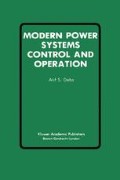Abstract
In the basic load flow problem, the so-called control variables are specified, permitting the feasibility of solution. We recall that the control variables consist of real power generation at all generation busses except the slack bus, and voltage magnitudes at all generation busses. The specification of these control variables is not arbitrary. It is based on several considerations. The first major consideration is that of satisfying all power demands within the acceptable tolerances for voltage levels, without violating the limits on generation levels, transmitted currents, and powers. (These demands and limits are normally referred to as the equality and inequality constraints, respectively.) There are usually wide ranges of control variable values for which all of these constraints are satisfied. As a result, one selects those control variable values which will minimize (or maximize) a desired performance index. One possible performance index can be the total losses in the transmission network. Another one can be the cost of generation needed to meet the demand. Yet a third performance index may reflect a combination of operating cost, security considerations, and possibly pollution levels.
Access this chapter
Tax calculation will be finalised at checkout
Purchases are for personal use only
Preview
Unable to display preview. Download preview PDF.
References
H. H. Happ, “Optimal Power Dispatch - A Comprehensive Survey,” IEEE Trans, on Power Apparatus and Systems, Vol. PAS-96, May-June, 1977.
H. W. Dommel and W. F. Tinney, “Optimal Power Flow Solutions,” IEEE Trans, on Power Apparatus and Systems, Vol. PAS- 87, Oct., 1968.
F. F. Wu, et al. , “A Two-Stage Approach to Solving Large-Scale Optimal Power Flows,” Proceedings of the Power Industry Computer Applications Conference, held in Cleveland, Ohio, May, 1979.
J. W. Carpentier, “Differential Injections Method: A General Method for Secure and Optimal Dispatch,” Proceedings of the 8-th PICA Conference, held in Minneapolis, MN, 1973.
D. I. Sun, B. Ashley, B. Brewer, A. Hughes, and W. F. Tinney, “Optimal Power Flow by Newton’s Approach,” IEEE Trans. on Power Apparatus and Systems, Vol. PAS-103, No. 10, Oct., 1984.
G. A. Maria and J. A. Findley, “A Newton Power Flow Program for Ontario Hydro EMS,” Paper 86-SM 326-3 presented at the IEEE/PES 1986 Summer Power Meeting, held in Mexico City, Mexico, July, 1986.
O. Alsac and B Stott, “Optimal Load Flow with Steady-State Security,” IEEE Trans, on Power Apparatus and Systems, Vol. PAS-93, No. 3, May/June, 1974.
H. H. Happ and K. A. Wiragau, “Static and Dynamic VAR Compensation in System Planning,” IEEE Trans. on Power Apparatus and Systems, Vol. PAS-97, Sept./Oct., 1978.
J. W. Lamont and M. R. Gent, “Environmentally-Oriented Dispatching Technique,” Proceedings of the 8-th PICA Conference, held in Minneapolis, MN, 1973.
Author information
Authors and Affiliations
Rights and permissions
Copyright information
© 1988 Kluwer Academic Publishers
About this chapter
Cite this chapter
Debs, A.S. (1988). Power Flow Optimization. In: Modern Power Systems Control and Operation. The Kluwer International Series in Engineering and Computer Science. Springer, Boston, MA. https://doi.org/10.1007/978-1-4613-1073-0_5
Download citation
DOI: https://doi.org/10.1007/978-1-4613-1073-0_5
Publisher Name: Springer, Boston, MA
Print ISBN: 978-1-4612-8414-7
Online ISBN: 978-1-4613-1073-0
eBook Packages: Springer Book Archive

